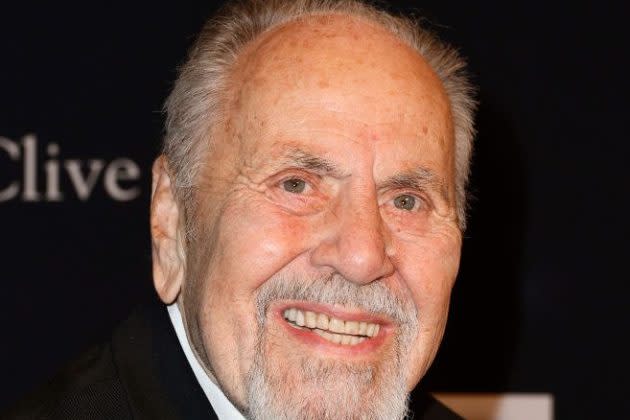‘Laugh-In’ Producer George Schlatter Dishes On Television Golden Age In New Memoir
- Oops!Something went wrong.Please try again later.
- Oops!Something went wrong.Please try again later.
- Oops!Something went wrong.Please try again later.

At age 93, producer George Schlatter has a lifetime of memories to look back at. Producing the groundbreaking and iconic TV comedy show Laugh-in is just one facet. There’s also presidential inaugurations, countless TV specials with big-name talent, running the Jerry Lewis Labor Day telethons, and hanging with Judy Garland and Frank Sinatra among them.
All of that and more is captured in a memoir just-released via Unnamed Press/Rare Bird Books, Still Laughing: A Life in Comedy.
More from Deadline
Already a well-regarded producer of television specials and variety shows by 1967, Schlatter pitched NBC on an idea that was a radical departure: a comedy special inspired by the hippie counter-culture, one which would take the idea of sit-ins, love-ins, and be-ins and manifest that politicized, sexualized, consciousness-raising energy into comedic sketches. The special that emerged, Laugh-in, was so successful it became a regular television series, running from January 1968 to March 1973 and eventually becoming the #1 show on TV.
Still Laughing recounts the coming-of-age of one of television’s great producers, from his early nightclub days in Vegas, rubbing elbows with iconic mob figures like Mickey Cohen and John Stompanato, to his influential friendships with Judy Garland and Frank Sinatra, the latter for whom he was asked to deliver a eulogy at his funeral.
The book is an inside look at the crucial role a working producer plays in bringing a show to life, and reveals the actual people (Garland, Sinatra, Cary Grant, Milton Berle, Liza Minnelli, among many others) cloistered inside their celebrity.
A three-time Emmy winner who has also been honored with Television Critics Association Awards, NAACP Image Awards, Golden Globes, the Directors Guild Award, and the Producers Guild “Man of The Year” honors, Schlatter found some time to answer a few questions from Deadline:
DEADLINE: How would you have used social media in the Laugh-In days? Do you see any parallels to what people are doing online now and what you did then?
Schlatter: I see tremendous similarities. We would take an item from the back page of a newspaper and make a story out of it. You had gossip columns and you had news items and we would latch on to any one of those and turn them into a humorous story.
DEADLINE: What’s your opinion of the way Hollywood is run now versus how it was in your career?
Schlatter: It is much more difficult now. In my era, you needed an answer from just one person. Today, you need ten people and a focus group to agree, and that’s why we’re kind of at a stand-still. Laugh-In was sold because I waltzed in with new people and new ideas and convinced them I could do anything. They said, ‘OK, go do it.’ We gathered up the Laugh-In cast, the writers and everybody else in a matter of weeks, and walked in with that show. It was a success because we didn’t have to get many people to agree. All we needed was Herb Schlosser or Fred Silverman to say ‘Yes’ and we went out and did it.
DEADLINE: If you weren’t in entertainment, do you think you would have been successful in business or politics?
Schlatter: I was enough of a success in entertainment that I survived business and politics. Had I started in business or politics, I’d still be living in the Valley. I endured them by accident. They were at the periphery of my success, not the reason for it.
DEADLINE: What current television shows do you admire?
Schlatter: The 6 o’clock news, because it answers no questions and only presents a blurred vision of current events.
DEADLINE: In the book, you are constantly vexed by “the suits” and their suggestions. For today’s producers who may be dealing with the same issues, what is your recommendation?
Schlatter: Pretend to listen… then do whatever you wanted to do before the meeting ever started.
DEADLINE: A key issue in the WGA strike is about the use of artificial intelligence. What’s your take on its use as a tool?
Schlatter: Artificial Intelligence is not new. We used to call it, “Memos from executives.” They were the first warning of the impending doom of artificial intelligence. They presented an answer for which there was no question. But we survived the early stages of artificial intelligence and we called it “stupidity.”
DEADLINE: Could you have had the career you had in today’s world?
Schlatter: I would have had the career that I had in any world because I arrived with an answer looking for a problem. That doesn’t happen today. I arrived at the meeting with an answer and that philosophy, coupled with an abundance of luck, makes you a success.
DEADLINE: Who would you cast in a version of Laugh-In airing in the fall?
Schlatter: Goldie Hawn. As a star, producer, director, writer and publicist. If Goldie wasn’t available, I would go to Lily Tomlin.
DEADLINE: Is cancel culture killing comedy, as some claim?
Schlatter: Cancel Culture? Cancel culture is the best thing for comedy, because it is the only way stupidity can rise to its important level of logic.
DEADLINE: You were a manager at Ciro’s. Do you have any current restaurants that you think would be comfortable with its patrons from those times?
Schlatter: Il Piccolino was Ciro’s without the gangsters. It was colorful, it was exciting and it was fun. The other place next to that would be Nate and Al’s. You get excitement, knowledge and heartburn, all of which are necessary for success.
Best of Deadline
Sign up for Deadline's Newsletter. For the latest news, follow us on Facebook, Twitter, and Instagram.

